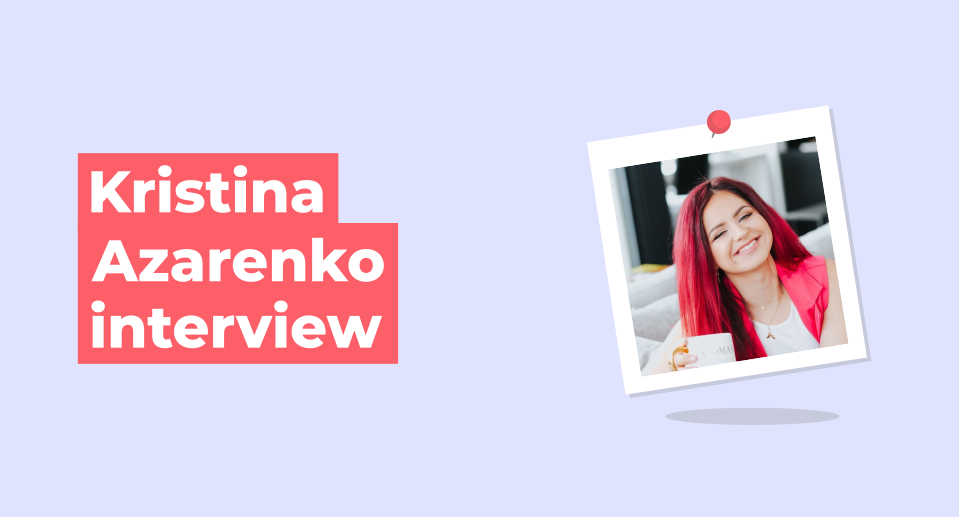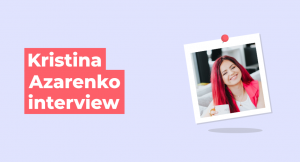Kristina Azarenko is a well-known name in the SEO community.
She’s the founder of a successful Toronto-based SEO consultancy called MarketingSyrup, creator of The SEO Challenge Course, and author of an eCommerce SEO newsletter – SEO Shop Up.
I’m happy she found some time in her busy schedule to share her insights and advice with us. She talks about some of the SEO challenges, tips on how to overcome them and much more.
Let’s dive in…
What was the last time you learned something new in SEO that was eye-opening for you? What was it?
It happened last week. There’s always something new to learn in SEO, right?
I did an unintentional test and saw how Google Search Console attributes impressions to the website URLs that appear in Twitter carousels in the Google search results.
I heard about it but only when I saw it with my own eyes, I realized how interesting (and often confusing) this is.
I posted about it here:
I did an unintentional Google SERPs test, and it's 🤯
The details in a short thread (as I find it hard to fit everything in just 1 tweet 😅)
— Kristina Azarenko (@azarchick) August 24, 2021
What would be the first advice you would give to someone who wants to do SEO for their website and doesn’t know how to start?
The very first thing would be to set a website up in Google Search Console so that you can analyze what’s going on with its visibility on Google. But to do such an analysis, you need to understand how to do it. (surprise!)
So my main advice would be to start learning SEO. Learn and then apply once you’re comfortable.
You also run a popular SEO course. What is one SEO area people struggle with the most? What is your advice for them?
It’s a great question. I’ve had 6 cohorts already and 100+ people have gone through my SEO Challenge Course, so I definitely see some common issues people face.
The main SEO thing most people struggle with is technical SEO. I think this is the hardest skill to pick up: it needs time, a proper structure, and hands-on learning. That’s what I help my students with. Otherwise, you’d be finding yourself in a panic any time a technical SEO issue comes up.
What are some technical SEO recommendations you would give to every website owner?
In a nutshell, my view of technical SEO is the following:
- Make sure that Google can index and rank pages that you want it to rank.
- Make sure that Google doesn’t access and index pages that you don’t want it to index and rank.
So my main advice is usually around building websites according to web standards and using directives such as meta-robots, canonicals and the robots.txt file to control the indexability and crawlability of a website.
How this can look in practice:
- All important pages have self-referencing canonical
- Duplicate content is either canonicalized or noindexed
- All pages that need to be crawled are allowed for crawling in robots.txt
- Images are indexable
- Links are added via the HREF attribute vs JavaScript events
Could you give one specific SEO technique/tip/strategy from your course exclusively to the readers of our blog?
Ok, it’s not going to be a ‘top-secret SEO hack that ranks any website within 1 day’. Such things just don’t exist, you know.
But there’s one notion I teach in the course that my students love – TRevenue. This is traffic that brings revenue vs traffic for the sake of traffic. I then teach my students to identify the right keywords that bring TRevenue and align these keywords with user intent.
What link building tip would you give to a beginner blogger?
Concentrate on research and quality.
You need to back up the topics you’re writing about with keyword research. Are people searching for it? Will it be possible to beat the competition with the new website?
Once you have researched and identified topics, concentrate on the quality of your content. Good content can attract links, especially if it ranks high.
Then include outreach so that more people know about your content and can link to it.
If you participate in any meetups, conferences as a speaker, make sure that a link to your website is included in your bio. These are the best and easiest ways to get links without sacrificing all your time for chasing them.
You need to back up the topics you’re writing about with keyword research. Are people searching for it? Will it be possible to beat the competition with the new website?
Google algorithm updates are a big topic in the SEO community. What would you recommend to someone who’s been hit by an algo update negatively?
Get help. Especially if you don’t know SEO.
Algo updates are dangerous, and there are people who specialize in helping companies to recover from them. So it’s better not to waste any time and go straight to people who can help.
Many SEOs complain about Google taking up more and more space in the SERPs, leaving less space for organic results. What’s your take on this?
It’s true, the search results are filling in with ads. At the end of the day, that’s how Google makes money.
But I don’t see any point in complaining about it, it won’t change anything. What we can do as SEOs is to do our best and also use additional SERP features such as featured snippets, structured data, etc.
Besides the classic skills needed to master SEO, such as knowing link building, on-page SEO or the basics of HTML, you also often mention soft SEO skills. What are these and why are they important?
At some point, any SEO faces the reality: the recommendations are not implemented. In many cases, it happens because of a lack of proper explanation and communication between the teams or with the client.
Then you start realizing: ok, it’s not only important to provide solid SEO recommendations. It’s also important to communicate them properly.
So one of the soft skills I find important to be successful as an SEO is communication.
One more would be curiosity. Since the SEO sphere is very dynamic, it’s important to follow what’s going on in it. Only a curious mind will succeed.
Let's fill in all the gaps!
Here's the updated list of the core #SEO skills that any SEO should have if they want to succeed.
Spoiler: there are NOT only hard skills, soft skills are also important, so I included them too.
Get the SEO Checklist here 👇 https://t.co/qxLrnJGHEC
— Kristina Azarenko (@azarchick) July 22, 2021
What do you think is the most harmful SEO myth out there?
I think the most harmful SEO myth is that only one part of SEO matters – content or technical SEO or link-building.
In reality, all of these are cornerstones for a good SEO strategy.
There are many “SEO gurus” but not all of them are reliable. How to determine what SEO advice to trust?
I think it’s quite a tricky question. I’d say that for me the characteristics of a person to trust in SEO (or any other sphere) would be:
- They should share relevant content backed up by experience
- They should be recognized by the community
- They should be practicing what they preach
What blog post made you “wow” recently?
I really loved the post by Areej AbuAli on prioritizing technical SEO recommendations. I think using T-shirt sizing to highlight priorities is genius.
I think the most harmful SEO myth is that only one part of SEO matters – content or technical SEO or link-building. In reality, all of these are cornerstones for a good SEO strategy.
Who would you recommend following in the SEO industry? Who are your heroes?
There are so many great people! To name a few:
Finally, let’s play a game. Never have I ever:
- Sent an outreach email with the wrong recipient’s name: I’ve never done it. But I once sent my CV and resume in an email without a subject. I woke up in cold sweat the next day when I realized it. It was pretty embarrassing.
- Published a post I am embarrassed about now: I don’t remember publishing such posts, to be honest. I usually pour my soul into what I write.
- Bought a backlink: Yes, it happened. I started as a link builder 10 years ago and I didn’t know many things I know today.
Kristina Azarenko
Kristina Azarenko is that red-haired girl that talks about eCommerce and technical SEO, helps her clients thrive online, teaches people no-BS SEO and dances hip-hop in between.
She is the founder of MarketingSyrup Digital Inc, creator of the SEO Challenge Course and a popular SEO Pro Extension. She has spoken at the Women in Tech SEO Festival, BrightonSEO Ecommerce SEO Summit, Google Search Central and many other great events.





